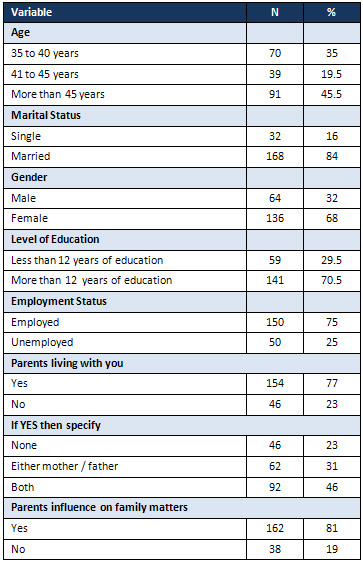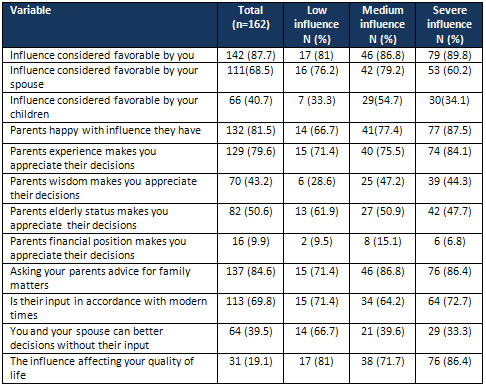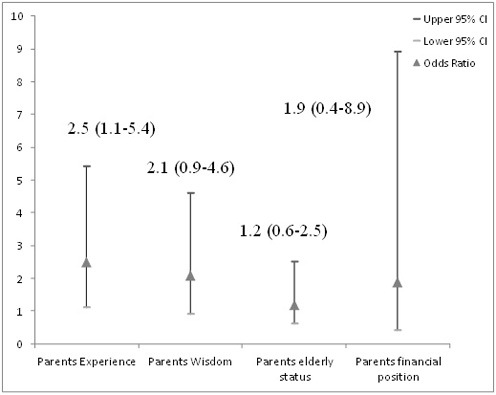|
Influence of Elderly
parent on family dynamics: results of a survey
from Karachi, Pakistan
Waris Qidwai
(1)
Imdad Ali Khushk (2)
Sabrina Allauddin (3)
Kashmira Nanji (4)
(1) Dr
Waris Qidwai
Professor and Chairman
Department of Family Medicine
The Aga Khan University
Karachi Pakistan
(2) Dr Imdad Ali Khushk
MBBS, MSPH, MBA
Pakistan Medical & Dental Council
Islamabad
(3) Sabrina Allauddin
Medical Student
Dow University of Health Sciences
Karachi Pakistan
(4) Kashmira Nanji
Epidemiologist
Aga Khan University, Karachi 74800, Pakistan
Correspondence:
Dr. Waris
Qidwai
MBBS, MCPS (FM), FCPS (FM), FRCGP (INT), FCGP(SL),
MFPH(UK)
The Tajuddin Chatoor
Professor and Chairman
Department of Family Medicine
Service Line Chief, Family Health
Aga Khan University, Karachi
Stadium Road, PO Box: 3500
Karachi-74800, Pakistan
Tel: 92-21-3486-4842 (Office) 92-3332317836
(Cell)
Fax: 92-21-3493-4294
Email: waris.qidwai@aku.edu
|
Abstract
Background: The current and projected
increase of the elderly population has
raised concerns about the financial, social,
and emotional support for the elderly.
The objective of this study was to explore
the level(s) to which elderly individuals
had an influence in important family matters
and daily life activities.
Methods: A cross-sectional study
was carried out in a tertiary care hospital
of Karachi, Pakistan through convenience
sampling during August to October 2014.
The individuals who were > 35 years
and had an elderly parent (> 65 years)
were included. A pre-tested structured
questionnaire was used for data collection.
Analysis was done using SPSS 19.0. Logistic
regression analysis was used to identify
the reasons for appreciating elderly parent's
influence in daily lives of study participants.
Results: A total of 200 study participants'
information was included. About 35% of
the participants were between 35 to 40
years of age and there was preponderance
of females (68%) in the study. The majority
(81%) of the participants responded that
their parents have an influence on their
family matters. Parents' experience (OR:
2.5; 95% CI: 1.1-5.4), wisdom (OR: 2.1;
95% CI: 0.9-4.6) and respect (OR: 1.2;
95% CI: 0.6-2.5) are some of the factors
in which participant(s) are influenced
by their elderly parents.
Conclusion: The study reveals that
children respect their elders' decision(s)
and appreciate their influence in family
matters. The elders should let children
take their own decisions and become autonomous.
Children on the other hand should give
respect to their elders and should involve
them in family decisions.
Key words:
elderly; geriatrics; family decisions;
family matters; family system; family
dynamics; social support
|
Family is a fundamental unit of any society.
In recent times, this unit has adjusted itself
to new challenges by changing its functions
to cope with new realities. The emergence of
the modern generation in a quickly changing
world is an illustrative example of it (1).
Besides, the advances in the field of medicine
over the past 50 years have led to an increase
in the average lifespan of the population and
in the developing world; ageing issues have
only recently begun to emerge as a cause of
concern(2). World Health Organization reports
that approximately six percent of the population
was aged over 60 years in 1998, however, it
will be almost doubled by 2025(3). This is because
of the rise in the life expectancy; which has
increased in the last three decades.(4).
As population ages there are many potential
problems that can affect the mental status and
overall health of the elderly(5). Although,
health problems are considered to be the fundamental
part of the aging process, the elderly face
major challenges in social as well as economic
aspects(5,6). The increase in world elderly
population has raised concerns about the financial,
social, and emotional support for the elderly(7).
Since change occurs in the elderly's socio-economic
status, the power to make decision(s) transfers
from the parents to the younger generation(8,9).
Due to this, the social position of elderly
within the family is compromised(8). It is important
to discuss the role of elderly population in
this modified family system. Moreover, the level
to which they would be involved in family matters
in the future is also questionable.
Sociologists have been debating the role of
elderly in the present society, wherein the
family structure has changed from extended/joint
to nuclear family system.(10) This change has
led to a gap between the young generation and
their grandparents; who had earlier played a
distinctive role in traditional education of
the children and decisions in family matters(11).
Therefore, it is important to identify the factors
and their extent for such changes.
Family systems in Asia vary considerably. However,
this new framework is now applicable to both
developed and developing countries(12). The
objective of this study was to examine the extent
to which seniors can influence the decisions
made in the family. It is one of the indicators
of assessing the social status of elderly. However,
it is a very important aspect to discuss for
the future role of elderly in families.
Study
Setting
and
Participants:
A
cross-sectional
survey
was
conducted
from
August
to
October
2014
in
a
tertiary
care
hospital
of
Karachi,
which
is
the
largest,
most
populous
and
cosmopolitan
city
of
Pakistan.
Those
individuals
aged
above
35
years
and
who
had
an
elderly
parent
(>
65
years)
were
recruited
for
study
through
convenience
sampling.
Consent
Written
informed
consent
was
taken
from
the
study
participants
after
the
study
protocol
had
been
explained
to
them.
Assurance
with
regards
to
confidentiality
was
provided
to
the
participants.
The
study
was
reviewed
and
permitted
by
the
departmental
research
committee
of
the
Aga
Khan
University.
Questionnaire
and
Data
Collection:
The
interviews
were
questionnaire
based.
The
initial
questionnaire
was
developed
in
English
which
was
later
translated
into
Urdu,
the
national
language,
for
clear
understanding
of
the
participants.
The
questionnaire
was
pre-tested
on
10
individuals
and
it
was
revised
based
on
the
findings
of
the
pre-test.
The
data
collectors
were
trained
before
data
collection
to
eliminate
interviewer
bias.
The
questionnaire
comprised
2
sections
beginning
with
the
demographic
details
of
the
study
participants.
The
second
section
of
the
questionnaire
was
about
the
extent
of
family
matters
influenced
by
elders;
if
it
has
a
positive
or
a
negative
impact
on
the
lives
of
the
study
participants.
The
extent
of
the
influence
of
elderly
was
categorized
into
three
levels
i.e.
low,
medium
and
high.
Statistical
Analysis:
Data
was
double
entered
and
analyzed
through
SPSS
19.0.
Proportions
were
calculated
and
chi-square
test
was
used
for
assessing
the
different
levels
of
influence.
Logistic
regression
analysis
was
used
to
identify
the
reasons
due
to
which
the
study
participants
were
influenced
by
elderly
parents.
All
the
analysis
was
two-tailed
and
a
p-value
of
0.05
was
considered
statistically
significant.
Results
are
reported
in
the
form
of
proportions,
odds
ratio
and
their
corresponding
95%
confidence
intervals.
A
total
of
200
study
participants'
information
was
included
in
the
final
analysis.
The
baseline
characteristics
of
the
study
participants
are
presented
in
Table
1.
Over
one-third
of
the
participants
(35%)
were
between
35
to
40
years
of
age
and
45.5%
were
more
than
45
years
of
age.
There
was
a
preponderance
of
females
in
the
study
sample
(68%).
About
70%
of
the
participants
had
more
than
12
years
of
education
and
three-quarters
of
the
participants
(75%)
were
employed.
Approximately
77%
of
the
participants
had
their
parents
living
with
them
and
46%
of
the
participants
lived
with
both
the
parents.
The
majority
(81%)
of
the
participants
responded
that
their
parents
have
an
influence
on
their
family
matters.
Table
1:
Baseline
characteristics
of
study
participants
(n=200)

Table
2
presents
the
level
of
parents'
influence
on
different
aspects
of
daily
living.
The
participants
responded
that
they
felt
the
highest
level
of
influence
from
parents
in
day
to
day
activities
of
daily
living
(77.3%,
P=0.001),
followed
by
influence
in
household
matters
(76.1%,
P=0.001).
Likewise,
regarding
influence
on
religious
beliefs
and
practices,
53.4%
of
the
participants
responded
that
their
parents
have
high
influence
in
religious
issues.
The
lowest
degree
of
influence
by
parents
was
felt
on
health
related
matters
(31.5%).
Click
here
for
Table
2:
Level
of
parents'
influence
on
different
aspects
of
daily
activities
The
majority
of
the
participants
(87.7%)
responded
that
the
influence
of
elderly
parents
is
favorable
to
them
(Table
3).
Moreover,
68.5%
of
the
spouses
considered
the
influence
of
elderly
parents
as
positive.
Approximately
81.5%
of
the
parents
are
happy
with
the
influence
they
have
on
their
families
while
80%
of
the
participants
mentioned
that
the
reason
for
accepting
parents
influence
on
their
lives
is
parents'
experience.
In
addition,
50.6%
of
the
participants
accepted
parents'
influence
because
of
the
respect
they
have
for
their
parents.
Table
3:
Parental
influence
and
factors
considered
favorably
by
study
participants
(n=200)

The
majority
of
the
participants
(84.6%)
responded
that
they
take
parents'
advice
on
family
matters
and
70%
of
their
decisions
are
in
accordance
with
the
modern
times.
The
participants
also
mentioned
that
they
along
with
their
spouses
cannot
take
better
decisions
without
input
from
the
elderly
parents.
Figure
1
depicts
the
reasons
for
accepting
elderly
parents
influence
in
daily
lives.
The
study
participants
responded
that
parents'
experience
(OR:
2.5;
95%
CI:
1.1-5.4),
parents'
wisdom
(OR:
2.1;
95%
CI:
0.9-4.6),
parents'
respect
(OR:
1.2;
95%
CI:
0.6-2.5)
and
at
times
parents'
financial
position
(OR:
1.9;
95%
CI:
0.4-8.9)
are
some
of
the
factors
by
which
they
are
influenced
by
their
elderly
parents.
Figure
1:
Reasons
for
appreciating
elderly
parents'
influence
in
daily
lives

The
joint
family
is
an
ancient
institution
of
the
sub-continent.
Several
generations
living
together
is
the
ideal
living
arrangement
where
elders
are
being
taken
care
of
and
their
opinion
is
sought
for
every
decision
in
family
related
matters,
but
it
has
undergone
some
changes
in
the
late
twentieth
century.
The
prominent
feature
of
the
joint
family
system
was
that
the
elderly
person
in
the
family
was
recognized
by
their
leader
who
has
been
considered
as
someone
having
a
firm
grip
keeping
the
entire
family
together
with
a
strong
foundation
of
morals
and
values.
In
addition
to
holding
a
sole
authoritative
place
in
the
decision
regarding
major
and
minor
family
matters,
their
advice
and
guidance
was
also
considered
irreplaceable.
The
continuous
and
growing
impact
of
urbanization,
secularization,
and
Westernization,
has
however,
made
a
significant
impact
on
the
family
systems,
both
in
terms
of
structure
as
well
as
decision-making.
The
societies
and
families
in
Pakistan
have
been
distinguished
for
their
cultural
values
and
lifestyles
since
centuries(10).
In
the
current
study,
46%
of
the
participants
had
both
of
their
parents
living
with
them.
This
study
assessed
the
level
of
the
impact
elders
have
on
family.
It
has
been
documented
that
in
a
joint
family,
the
family
has
been
more
dependent
on
the
decision-making
powers
of
the
elderly
members
of
the
family
as
compared
to
the
ones
who
are
living
separate
from
their
parents
and
almost
all
the
areas
of
their
lives
have
been
contributed
to
by
them(4,5).
Though
in
an
opinion
of
a
minor
group,
the
contribution
given
by
the
elderly
members
of
the
family
is
appreciated,
the
younger
group
of
the
family
ends
up
in
difference
of
opinions
and
perceptions(13,14).
People's
perception
of
the
aging
process
varies
from
culture
to
culture,
for
instance,
aging
can
be
regarded
as
an
unwanted
phenomenon
in
one
culture;
and
in
another
it
can
be
a
mark
for
wisdom,
survival,
and
eminence
(15,16).
In
this
study,
upon
enquiring
about
reasons
for
favoring
the
influence
of
elders
in
family
matters,
a
vast
majority
of
the
subjects
pointed
out
that
the
elders
have
more
experience
in
dealing
with
daily
life
issues
(OR:
2.5;
95%
CI:
1.1-5.4),
and
better
ways
of
solving
problems
(OR:
2.1;
95%
CI:
0.9-4.6).
The
study
participants
also
responded
that
respect
of
the
elderly
is
another
factor
for
accepting
the
parents'
influence.
A
considerable
proportion
of
the
families
considered
that
the
elderly
affected
their
lives
in
a
good
way
and
they
have
a
better
approach
to
the
issues
regarding
family
matters.
In
Asian
families,
elderly
are
considered
to
be
a
source
of
inspiration
and
are
looked
upon
as
a
primary
source
of
guidance(17,18).
After
retirement,
there
is
a
drastic
change
in
the
lifestyle
of
an
elderly
characterized
by
sudden
loss
of
income,
which
leads
to
an
abrupt
transition
from
head
of
the
family
to
an
inactive
member
in
decision-making,
and
consequently
leads
to
low
self-image
and
depression
(17,19,20).
On
the
contrary,
in
this
study,
the
majority
of
the
participants
responded
that
not
only
they
but
their
spouse
also
respects
the
decision
of
the
elderly
family
member.
However,
we
could
not
cross-validate
the
findings
with
the
elderly
family
member(s).
In
this
study,
76.1%
of
the
participants
responded
that
they
feel
high
severe
influence
of
their
parents
in
the
actions
of
daily
living.
This
can
be
disturbing
on
part
of
the
children
as
in
today's
world
male
and
females
both
are
working
to
make
their
ends
meet
and
they
need
to
make
certain
decisions
that
they
are
capable
of
doing
because
of
the
changes
in
life
style
and
other
norms
of
the
society(7,21,22).
A
relatively
smaller
group
of
the
participants
pointed
out
that
their
lives
have
been
less
influenced
by
the
elders
and
they
are
of
the
opinion
that
family
matters
are
handled
in
a
better
way
by
their
own
decision-making
powers
for
their
family(21,
23).
Therefore,
the
elderly
parents
should
allow
a
certain
degree
of
freedom
to
their
children
to
take
decisions
at
least
regarding
activities
of
daily
living
(1,8,24).
This
study
had
certain
limitations.
Firstly,
the
data
was
collected
from
a
tertiary
care
hospital
and
so
the
results
might
not
apply
to
the
general
population.
Moreover,
in
the
study,
we
inquired
about
parents
influence
from
their
children
but
we
did
not
include
parents'
perspective.
Therefore,
future
studies
on
this
issue
are
warranted
to
include
perspective
of
participants
from
different
parts
of
Pakistan
and
also
the
population
living
in
rural
areas,
so
as
to
further
understand
and
obtain
views
of
both
i.e.
children
and
their
parents.
The
study
reveals
that
children
respect
their
elders'
decisions
and
appreciate
their
influence
in
family
matters.
In
addition,
they
look
up
to
their
elders
because
of
their
experience
and
better
approach
in
solving
problems.
However,
it
is
essential
to
achieve
a
balance
for
harmony
in
families,
both
from
elderly
parents
and
their
children.
Both
the
groups
should
realize
their
boundaries
and
limitations.
The
elders
should
give
space
and
freedom
to
their
children
so
that
they
can
be
autonomous
and
are
prepared
for
the
future.
Children
on
the
other
hand
should
give
proper
care,
respect
to
their
elders
and
should
involve
them
in
family
decisions
so
that
they
do
not
feel
worthless.
1.
Li
H,
Ji
Y,
Chen
T.
The
roles
of
different
sources
of
social
support
on
emotional
well-being
among
Chinese
elderly.
PloS
one.
2014;9(3):e90051.
2.
Bowling
A,
Browne
PD.
Social
networks,
health,
and
emotional
well-being
among
the
oldest
old
in
London.
Journal
of
gerontology.
1991;46(1):S20-S32.
3.
Cantor
MH.
Family
and
community:
Changing
roles
in
an
aging
society.
The
gerontologist.
1991;31(3):337-46.
4.
Prince
MJ,
Harwood
RH,
Blizard
R,
Thomas
A,
Mann
AH.
Social
support
deficits,
loneliness
and
life
events
as
risk
factors
for
depression
in
old
age.
The
Gospel
Oak
Project
VI.
Psychological
medicine.
1997;27(02):323-32.
5.
Siu
O-L,
Phillips
DR.
A
study
of
family
support,
friendship,
and
psychological
well-being
among
older
women
in
Hong
Kong.
The
International
Journal
of
Aging
and
Human
Development.
2002;55(4):299-319.
6.
Thompson
MG,
Heller
K.
Facets
of
support
related
to
well-being:
quantitative
social
isolation
and
perceived
family
support
in
a
sample
of
elderly
women.
Psychology
and
aging.
1990;5(4):535.
7.
Kendig
HL,
Coles
R,
Pittelkow
Y,
Wilson
S.
Confidants
and
family
structure
in
old
age.
Journal
of
gerontology.
1988;43(2):S31-S40.
8.
Pinquart
M,
Sörensen
S.
Influences
of
socioeconomic
status,
social
network,
and
competence
on
subjective
well-being
in
later
life:
a
meta-analysis.
Psychology
and
aging.
2000;15(2):187.
9.
Zarit
SH,
Reever
KE,
Bach-Peterson
J.
Relatives
of
the
impaired
elderly:
correlates
of
feelings
of
burden.
The
gerontologist.
1980;20(6):649-55.
10.
Taqui
AM,
Itrat
A,
Qidwai
W,
Qadri
Z.
Depression
in
the
elderly:
Does
family
system
play
a
role?
A
cross-sectional
study.
BMC
psychiatry.
2007;7(1):57.
11.
Rubenstein
RL.
The
role
of
grandparents
in
the
psychological
development
of
children:
a
cross-cultural
study
2015.
Doctoral
Dissertation.
12.
Lu
L.
Social
Support,
Reciprocity,
and
Well-Being.
The
Journal
of
social
psychology.
1997;137(5):618-28.
13.
Mullins
LC,
Mushel
M.
The
Existence
and
Emotional
Closeness
of
Relationships
with
Children,
Friends,
and
Spouses
The
Effect
on
Loneliness
among
Older
Persons.
Research
on
Aging.
1992;14(4):448-70.
14.
Antonucci
TC,
Birditt
KS,
Sherman
CW,
Trinh
S.
Stability
and
change
in
the
intergenerational
family:
A
convoy
approach.
Ageing
and
Society.
2011;31(07):1084-106.
15.
Yi
Z,
Wang
Z.
Dynamics
of
family
and
elderly
living
arrangements
in
China:
New
lessons
learned
from
the
2000
census.
China
Review.
2003:95-119.
16.
Wellman
B,
Wortley
S.
Brothers'
keepers:
Situating
kinship
relations
in
broader
networks
of
social
support.
Sociological
perspectives.
1989;32(3):273-306.
17.
Chou
K-L,
Chi
I.
Reciprocal
relationship
between
social
support
and
depressive
symptoms
among
Chinese
elderly.
Aging
&
Mental
Health.
2003;7(3):224-31.
18.
Adams
RG,
Blieszner
R.
Aging
well
with
friends
and
family.
American
Behavioural
Scientist.
1995;39:209-24.
19.
Shanas
E.
The
family
as
a
social
support
system
in
old
age.
The
gerontologist.
1979;19(2):169-74.
20.
Agneessens
F,
Waege
H,
Lievens
J.
Diversity
in
social
support
by
role
relations:
A
typology.
Social
networks.
2006;28(4):427-41.
21.
Ducharme
F,
Couture
M,
Lamontagne
J.
Decision-making
process
of
family
caregivers
regarding
placement
of
a
cognitively
impaired
elderly
relative.
Home
health
care
services
quarterly.
2012;31(3):197-218.
22.
Colombo
F,
Aroldi
P,
Carlo
S.
"Stay
Tuned":
The
Role
of
ICTs
in
Elderly
Life.
Health
Technology
And
Informatics
203.
2014:145.
23.
Mullins
LC,
Johnson
DP,
Andersson
L.
Loneliness
of
the
elderly:
The
impact
of
family
and
friends.
Journal
of
Social
Behavior
&
Personality.
1987.
24.
Litwin
H.
Social
network
type
and
morale
in
old
age.
The
gerontologist.
2001;41(4):516-24.
|

